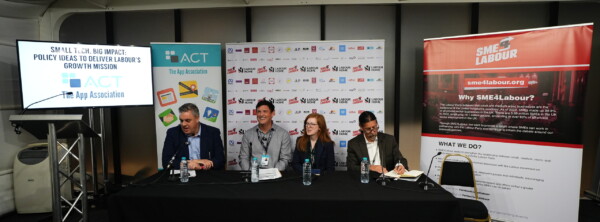Our UK Country Manager, Stephen Tulip, shares his thoughts after attending the Labour Party Conference 2025
 Party conference season is a fixture of the UK political calendar. Falling just after the summer holidays, these conferences are a big deal for political parties. They energise supporters, raise money and welcome thousands, or tens of thousands, of politicos through the doors.
Party conference season is a fixture of the UK political calendar. Falling just after the summer holidays, these conferences are a big deal for political parties. They energise supporters, raise money and welcome thousands, or tens of thousands, of politicos through the doors.
Party conferences are attended by an eclectic mix of politicians, journalists, party members, lobbyists, and campaigners. You also get the odd politically savvy celebrity wandering about. The exciting thing about conference is the access. Everyone is mingling so there is ample opportunity for politics geeks like me to spot well-known MPs and journalists. I even found myself seated two tables away from the Prime Minister one evening!
Beyond the buzz, hundreds of fringe events provide the real substance – covering everything from industry challenges to charitable and social causes. They make sure important issues are heard.
An important part of Labour’s conference is the Prime Minister and the Chancellor giving headline speeches, often containing big announcements. This year’s speeches set out the government’s priorities on the economy, technology, and skills. For small tech companies, these decisions will shape the environment for innovation, investment, and growth.
Headline Announcements
- Digital NHS: Prime Minister Kier Starmar announced a new virtual hospital service, launching in 2027 via the National Health Service (NHS) app. It is expected to deliver 8.5 million consultations and assessments in its first three years. This signals a major role for digital technology in public services.
- Skills shift: The government moved away from the old target of 50 per cent of young people going to university. By 2040, the new ambition is for two-thirds to progress to university or high-quality apprenticeships — signalling a stronger focus on technical and vocational routes.
- Fiscal policy: Chancellor Rachel Reeves underlined her fiscal rules but warned that tough global conditions mean some tax pledges may need to be revisited. She set out Labour’s case for growth through investment in infrastructure, health, transport and industrial policy.
Themes for Tech and Business
While AI dominated many discussions, several broader themes emerged across conference:
- AI and sovereignty: Businesses are keen to see clarity on access to compute power, data, and regulation. For startups, this is about securing the foundations for innovation.
- Stability for Small and Medium-Sized Enterprises (SMEs): Policy certainty on tax, regulation and investment is essential for smaller companies to plan and scale.
- Industrial strategy: Government commitments to manufacturing and regional growth must also serve SMEs, not only large corporates.
- Skills and inclusion: More apprenticeships and technical education will support the talent pipeline. Immigration and visa rules also remain critical to filling skills gaps in tech.
 Bringing Small Business to the Table
Bringing Small Business to the Table
ACT | The App Association was pleased to bring SMEs directly into the conversation at conference. I hosted a panel with two startups and two newly elected ministers – Blair McDougall MP, Small Business Minister and Kanishka Narayan MP, Minister for AI and Online Safety. The startups on the panel were Caroline Laurenson, founder of member company Kindspace and William Fish, founder of member company Manulytica. Both were there to discuss the opportunities and challenges small tech companies face.
The discussion underlined how policy decisions on AI, standard-essential patents, and funding will directly affect the ability of SMEs to innovate and grow. Panels like this ensure policymakers hear directly from entrepreneurs about the barriers they face and the opportunities to help them thrive.
What’s Next
For SMEs in tech, the key questions in the months ahead are:
- How will the forthcoming budget balance fiscal rules with the need to invest?
- Will the skills reforms deliver the talent pipeline fast-growing sectors require?
- How will the UK invest in compute, data, and AI infrastructure?
- Can government provide the policy stability SMEs need to scale?
Labour used the conference to pitch itself as the party of renewal and growth. The UK’s startups and SMEs will be watching closely to see how that admirable ambition translates into tangible benefits for their businesses.